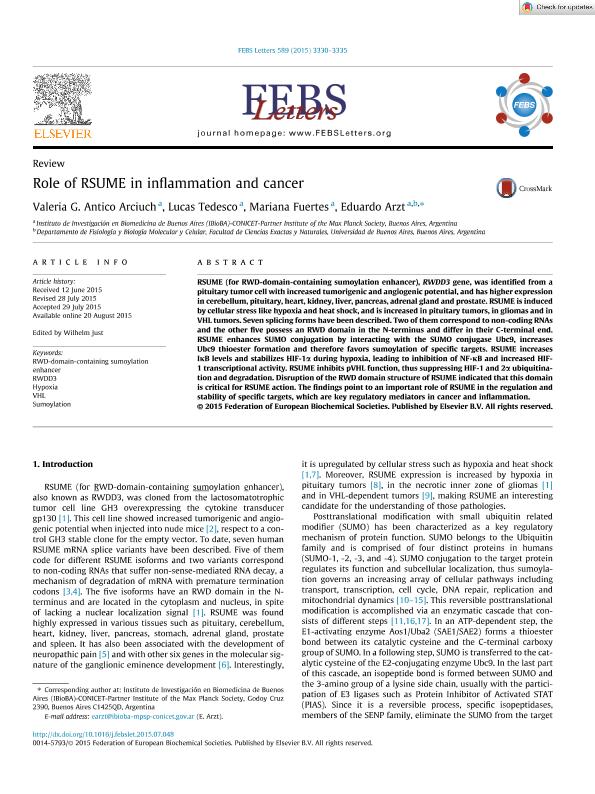Artículo
Role of RSUME in inflammation and cáncer
Fecha de publicación:
08/2015
Editorial:
Elsevier Science
Revista:
Febs Letters
ISSN:
0014-5793
Idioma:
Inglés
Tipo de recurso:
Artículo publicado
Clasificación temática:
Resumen
RSUME (for RWD-domain-containing sumoylation enhancer), RWDD3 gene, was identified from a pituitary tumor cell with increased tumorigenic and angiogenic potential, and has higher expression in cerebellum, pituitary, heart, kidney, liver, pancreas, adrenal gland and prostate. RSUME is induced by cellular stress like hypoxia and heat shock, and is increased in pituitary tumors, in gliomas and in VHL tumors. Seven splicing forms have been described. Two of them correspond to non-coding RNAs and the other five possess an RWD domain in the N-terminus and differ in their C-terminal end. RSUME enhances SUMO conjugation by interacting with the SUMO conjugase Ubc9, increases Ubc9 thioester formation and therefore favors sumoylation of specific targets. RSUME increases IκB levels and stabilizes HIF-1α during hypoxia, leading to inhibition of NF-κB and increased HIF-1 transcriptional activity. RSUME inhibits pVHL function, thus suppressing HIF-1 and 2α ubiquitination and degradation. Disruption of the RWD domain structure of RSUME indicated that this domain is critical for RSUME action. The findings point to an important role of RSUME in the regulation and stability of specific targets, which are key regulatory mediators in cancer and inflammation.
Archivos asociados
Licencia
Identificadores
Colecciones
Articulos(IBIOBA - MPSP)
Articulos de INST. D/INV.EN BIOMED.DE BS AS-CONICET-INST. PARTNER SOCIEDAD MAX PLANCK
Articulos de INST. D/INV.EN BIOMED.DE BS AS-CONICET-INST. PARTNER SOCIEDAD MAX PLANCK
Citación
Antico Arciuch, Valeria Gabriela; Tedesco, Lucas; Fuertes, Mariana; Arzt, Eduardo Simon; Role of RSUME in inflammation and cáncer; Elsevier Science; Febs Letters; 589; 22; 8-2015; 3330–3335
Compartir
Altmétricas




